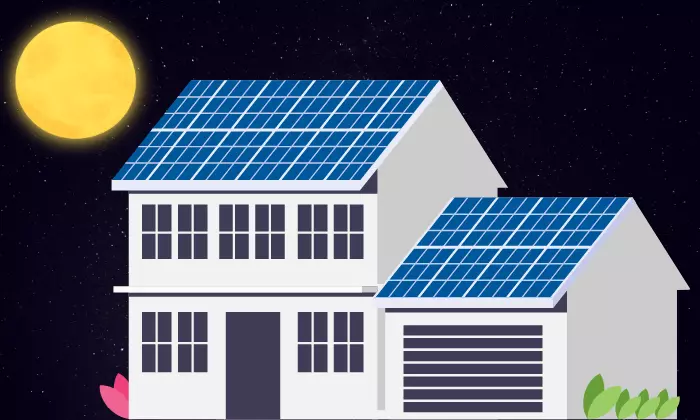How Do Solar Panels Work At Night

Solar panels are pivotal in harnessing sunlight to generate electricity through the photovoltaic effect. However, during the night, when sunlight is absent, an alternative source is needed to power our homes. So, how do solar panels work at night? This article explores the possibilities of using stored solar energy to illuminate the night and its advantages and disadvantages.
Nighttime Energy Sources
Traditional solar panels cease to function when the sun sets since they rely on direct sunlight. The night sky offers only moonlight, which is significantly dimmer and possesses considerably less energy, approximately 400,000 times fainter than direct sunlight on a clear day. Consequently, solar panels cannot effectively capture and convert moonlight into electricity.
Nighttime Solar Production
While moonlight is insufficient to power homes directly, some experts suggest that solar panels produce a modest amount of energy at night, potentially around 10 watts. This minimal output could be adequate for low-power applications such as lighting a bathroom throughout the night.
Energy Harvesting and Storage
In a grid-connected solar system, the absence of solar production during the night is not a significant concern. Electricity can be drawn from the grid at any time, and nighttime electricity rates are often lower, helping to control energy costs. However, energy storage solutions are available for those seeking energy independence or wanting to maximize the use of solar energy.
Solar Energy Storage Solutions
Solar energy storage solutions come in various forms, with off-grid and hybrid solar systems featuring storage batteries as the key component. During daylight hours, solar panels generate excess energy, a portion of which is stored in batteries to be used at night or during power outages.
Types of Solar Batteries
Solar batteries come in two main types: lead-acid and lithium. Lithium batteries outshine their lead-acid counterparts, boasting an efficiency of 85-95% compared to the 60-80% efficiency of lead-acid batteries. Lithium batteries also offer a longer lifespan, lasting up to a decade, and a depth of discharge (DOD) reaching 100%.
Modular Backup Solutions
A popular choice among consumers is the modular backup system. Generac offers DC solar batteries with storage capacities ranging from 8.6kWh to 17.1kWh, which can be neatly arranged in dedicated battery enclosures. Additional battery modules can be seamlessly integrated into the setup as energy needs grow.
Pros and Cons of Using Stored Solar Energy at Night
Utilizing stored solar energy during nighttime presents several advantages and disadvantages.
Pros of Stored Solar Energy
Uninterrupted Power Supply: Solar energy storage systems ensure a reliable backup during nighttime or power outages, reducing reliance on the grid.
Environmentally Friendly: These systems maximize clean, renewable energy, reducing greenhouse gas emissions and contributing to a more sustainable planet.
Cost Savings: Using stored solar energy during peak electricity demand hours, such as in the evening, helps homeowners avoid higher energy costs.
Cons of Stored Solar Energy
Initial Cost: The upfront expense of installing solar energy storage systems can be relatively high, nearly doubling the overall system cost.
Efficiency Loss: Energy conversion and storage processes may result in some energy loss, diminishing the system’s overall efficiency.
Maintenance and Replacement: Batteries require regular maintenance and eventual replacement, adding to the overall cost of the solar energy storage setup.
While solar panels cannot operate at night, stored solar energy presents a viable solution to keep the lights on and reduce dependence on the grid. The choice of energy storage system and its associated benefits and drawbacks should be carefully considered when planning a solar energy setup. Contact Solar Earth Inc for residential solar installation or commercial solar installation.
